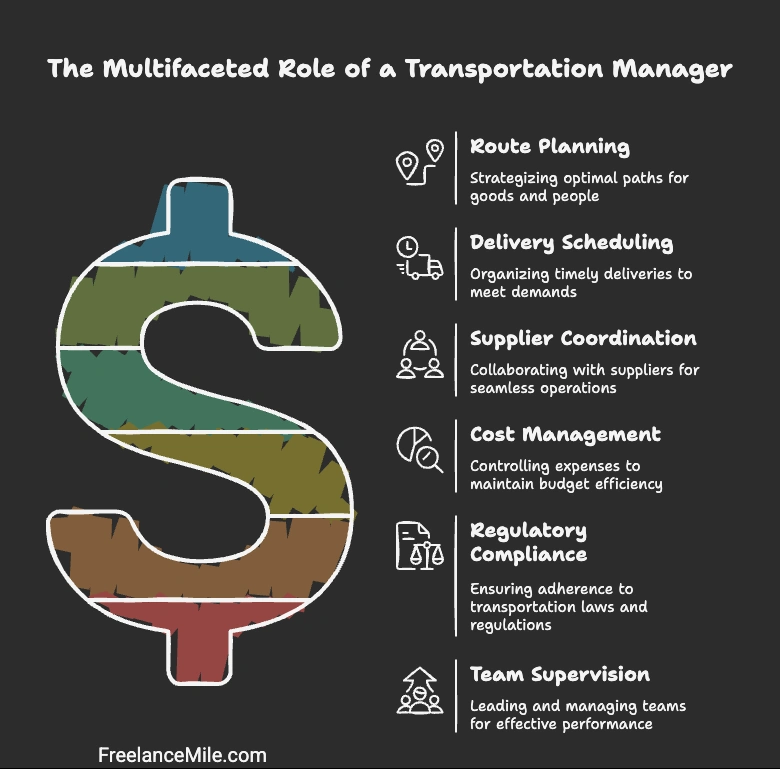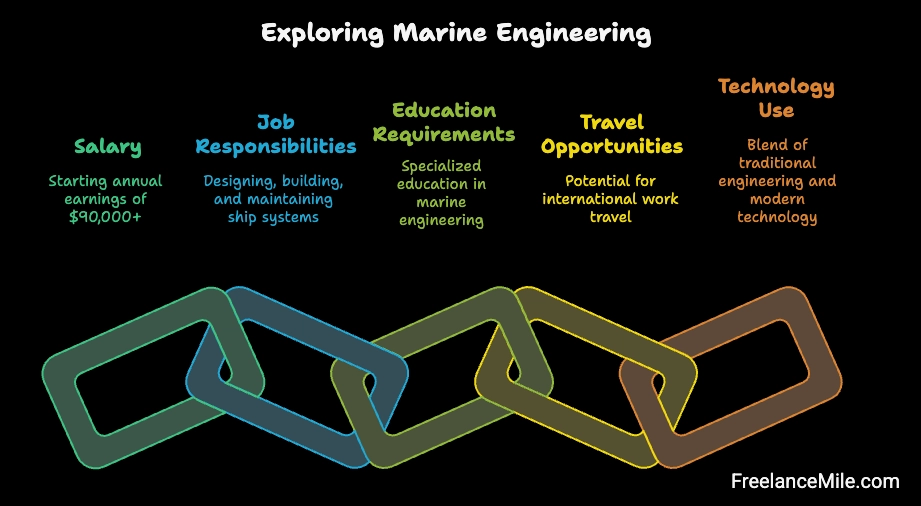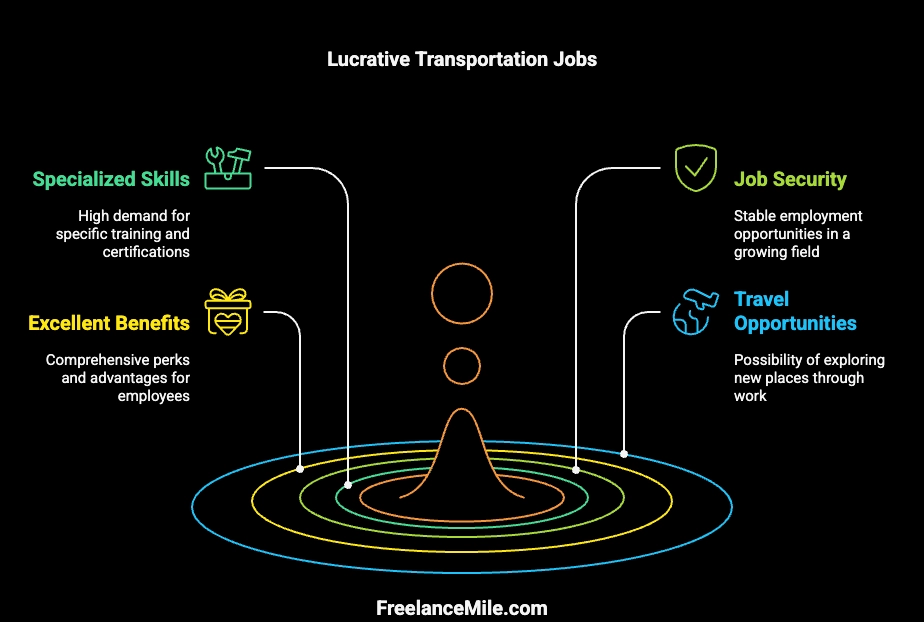Have you ever been stuck in traffic and wondered about the people who make our transportation systems work? I know I have!
A few years ago, I was feeling stuck in my digital marketing career and started exploring other industries with growth potential. Transportation caught my eye immediately.
What I discovered blew my mind – not only is transportation the backbone of our economy, but it also offers some seriously impressive paychecks!
The transportation industry is growing rapidly with new technologies & increasing global trade, creating amazing opportunities for those willing to jump on board.
In this post, I’m sharing the absolute best paying jobs in transportation that could completely transform your career path.
Some of these salaries might make your jaw drop – especially #1 on our list that can earn you up to $350K annually! Yes, you read that right!
Ready to explore these lucrative career paths? Let’s check them out!
10 Best Paying Jobs in Transportation

Now, let’s get to the good stuff – the 10 best paying jobs in transportation that could completely change your financial future.
1. Airline Pilot – $100,000 to $350,000
If you’ve ever dreamed of soaring through the clouds while earning a top-tier salary, becoming an airline pilot might be your calling!
Airline pilots are responsible for safely flying commercial aircraft carrying passengers and cargo to destinations around the world. They’re the ultimate transportation professionals, combining technical expertise with cool-headed decision making.
The job involves pre-flight preparations, route planning, fuel calculations, and constant communication with air traffic control. It’s definitely not a job for the faint of heart!
What makes this position the #1 best paying job in transportation? Senior captains at major airlines can earn upwards of $350,000 annually, with additional perks like travel benefits for themselves and their families.
While the training requirements are rigorous (you’ll need specific licenses and thousands of flight hours), the payoff is enormous. Plus, there’s something undeniably cool about saying “I’m a pilot” at parties!
2. Transportation Manager – $85,000 to $140,000
Transportation managers are the masterminds behind efficient movement of goods and people. They’re the ones ensuring everything runs smoothly behind the scenes.
Their responsibilities include planning routes, scheduling deliveries, coordinating with suppliers and customers, managing transportation costs, ensuring regulatory compliance, and supervising drivers and vehicles.
What I find fascinating about this role is how it combines analytical thinking with people management. You’re constantly optimizing for efficiency while also leading a team.
With an avg. salary range of $85,000 to $140,000, transportation managers are well-compensated for their expertise. The best part? This role is in high demand across multiple industries – from retail to manufacturing to logistics companies.

3. Logistics Manager – $65,000 to $110,000
Logistics managers are the problem-solving wizards of the transportation world. They oversee the entire supply chain process, ensuring products move efficiently from suppliers to customers.
Their day-to-day responsibilities include managing inventory levels, coordinating transportation schedules, optimizing costs, and ensuring everything arrives where it needs to be, when it needs to be there.
I’ve worked with logistics managers during my marketing career, and let me tell you – their ability to juggle multiple moving parts is nothing short of impressive!
With salaries ranging from $65,000 to $110,000, logistics managers earn competitive compensation for their critical role in keeping supply chains running smoothly.
The demand for skilled logistics managers continues to grow as companies focus more on efficient supply chain management to stay competitive. Could this be your calling?
4. Air Traffic Controller – $90,000 to $130,000
Have you ever wondered who’s responsible for making sure planes don’t crash into each other? That would be air traffic controllers – the unsung heroes of aviation safety!
Air traffic controllers monitor and direct aircraft movements both in the air and on the ground. They provide clearances and instructions to pilots, monitor aircraft positions, manage traffic flow, provide emergency services, and communicate with other control centers.
This job requires incredible focus, quick decision-making, and the ability to remain calm under pressure. Not everyone is cut out for it, which is partly why it pays so well!
With salaries typically ranging from $90,000 to $130,000, air traffic controllers are among the best-paid professionals in transportation. The job security is excellent too, as this role can’t be outsourced or automated.
One thing to note – becoming an air traffic controller typically requires specialized training through the Federal Aviation Administration (FAA) and passing rigorous tests. But for those who make it through, the rewards are substantial!
5. Marine Engineer – $90,000+
If you love the idea of working with massive ships and ocean-going vessels, marine engineering might be your perfect career path!
Marine engineers design, build, and maintain the mechanical systems on ships – including propulsion, steering, and power generation. They’re the reason these enormous vessels can navigate safely across oceans.
What makes this job particularly interesting is the blend of traditional engineering principles with cutting-edge technology. Modern ships are incredibly complex machines!
With average annual salaries starting around $90,000, marine engineers enjoy excellent compensation along with the opportunity to work on fascinating projects. Many also appreciate the potential to travel internationally as part of their work.
The field requires specialized education in marine engineering or a related discipline, but the investment pays off with a stable, well-compensated career path.

6. Locomotive Engineer – $60,000 to $100,000
There’s something undeniably cool about trains, isn’t there? As a locomotive engineer, you’d be the person actually driving these massive machines!
Locomotive engineers operate trains that transport passengers or freight across the country. They monitor instruments, follow safety protocols, and ensure timely arrivals at destinations.
The job requires extensive training and certification, with a strong focus on safety procedures. After all, you’re responsible for equipment worth millions and potentially hundreds of passengers!
With salaries ranging from $60,000 to $100,000, locomotive engineers earn solid compensation for their specialized skills. The job also typically comes with excellent benefits and union protection.
One aspect I find appealing about this career is the structured schedule – while you might work unusual hours, the routes and timetables are generally predictable, which can be great for work-life balance.
7. Fleet Manager – $60,000 to $95,000
Fleet managers are the organizational geniuses who keep company vehicles running efficiently and cost-effectively.
They oversee maintenance schedules, ensure regulatory compliance, manage driver assignments, and optimize vehicle utilization. It’s a role that combines technical knowledge with strong management skills.
What makes fleet management particularly valuable is its direct impact on a company’s bottom line. An effective fleet manager can save their organization significant money through preventive maintenance and efficient operations.
With salaries generally ranging from $60,000 to $95,000, fleet managers are well-compensated for their expertise. The role also offers excellent stability, as virtually every company with a vehicle fleet needs this position.
I’ve seen firsthand how a good fleet manager can transform a company’s operations – making them more efficient, safer, and more profitable!
8. Transportation Coordinator – $65,758
Transportation coordinators are the detail-oriented professionals who make sure everything and everyone gets where they need to go on time.
Their responsibilities include dispatching drivers, reviewing cargo requirements, analyzing distances, and designing efficient routes. They use specialized software to optimize schedules and minimize costs.
What I find fascinating about this role is how it combines technical knowledge with problem-solving skills. You’re constantly adapting to changing conditions like weather, traffic, or last-minute schedule changes.
With an average annual salary of around $65,758, transportation coordinators earn competitive compensation for their organizational expertise. The position also offers good advancement opportunities, potentially leading to management roles.
This career path is accessible with relevant experience and doesn’t necessarily require an advanced degree, making it an attractive option for many transportation professionals.
9. Cargo Loader – $52,284
Don’t let the relatively straightforward title fool you – cargo loaders play a vital role in the transportation ecosystem and can earn surprisingly good money!
Cargo loaders are responsible for safely loading & unloading goods from trucks, ships, or planes. They keep detailed records of all materials handled, track deliveries and orders, and ensure everything is stored properly.
The job requires physical stamina, attention to detail, and often certification to operate specialized equipment like forklifts or cranes.
With an average annual salary of $52,284 (including an estimated $3,668 in additional compensation), cargo loaders earn solid wages for work that doesn’t require extensive formal education.
What makes this position particularly attractive is the potential for overtime pay and the satisfaction of doing tangible, physical work that’s essential to global commerce.
10. Bus Driver – $40,000 to $60,000
Bus drivers might not be the highest-paid professionals on our list, but they deserve recognition for the essential service they provide and the solid compensation they can earn.
Transit and intercity bus drivers transport passengers along designated routes, maintaining schedules and prioritizing safety. They manage passenger interactions, navigate varying traffic conditions, and ensure everyone reaches their destination safely.
The job requires patience, strong driving skills, and often a commercial driver’s license (CDL) with passenger endorsement.
With salaries generally ranging from $40,000 to $60,000, bus drivers earn respectable wages for a position that doesn’t require advanced education. Many positions also come with excellent benefits, pension plans, and union representation.
What I appreciate about this career is its stability – public transportation is an essential service that remains in demand regardless of economic conditions.
What Makes Transportation Jobs So Lucrative?
Before we dive into the specific roles, let’s talk about why transportation jobs pay so well in the first place.
Transportation isn’t just about moving stuff from point A to point B – it’s the invisible force that keeps our entire economy running!
Think about it: without transportation professionals, store shelves would be empty, Amazon packages wouldn’t arrive, and international trade would grind to a halt. Pretty important, right?
The transportation industry is projected to grow at least 5% over the next few years. That’s huge!
And with growth comes opportunity – especially for those with specialized skills and certifications.
What I’ve noticed in my years analyzing different industries is that transportation offers something unique: high-paying jobs that often don’t require expensive four-year degrees. Instead, they value specialized training, certifications, and experience.
Many of these positions also offer excellent benefits, job security, and even travel opportunities. Not a bad deal at all!

How to Break Into These Lucrative Transportation Careers
Now that we’ve explored the best paying jobs in transportation, you might be wondering: “How do I actually get started in one of these careers?”
Great question! Here’s my advice based on what I’ve observed in the industry:
Identify Your Interests and Strengths
Which aspects of transportation appeal to you most? Do you love the idea of flying planes? Managing complex logistics? Operating heavy machinery?
Be honest about your strengths too. Some roles require technical aptitude, others need strong people skills, and many demand attention to detail and safety consciousness.
Research Specific Requirements
Each transportation career has its own path:
- Airline pilots need flight training and specific licenses
- Logistics managers often benefit from supply chain education
- Air traffic controllers require specialized FAA training
- Fleet managers typically need experience with vehicle maintenance
Take time to understand exactly what’s required for your target role.
Invest in Relevant Education and Certification
Depending on your chosen path, you might need:
- Commercial Driver’s License (CDL)
- Bachelor’s degree in logistics, engineering, or supply chain management
- Flight school training
- Specialized certifications specific to your field
Many community colleges offer excellent transportation-related programs at affordable prices!
Gain Entry-Level Experience
Everyone starts somewhere! Consider positions like:
- Dispatcher
- Driver
- Warehouse associate
- Administrative assistant in a transportation department
These roles provide valuable industry exposure while you work toward more advanced positions.
Network Actively
Join industry associations, attend transportation conferences, and connect with professionals on LinkedIn. The transportation world is surprisingly interconnected, and personal relationships can open doors!
Why Transportation Careers Will Continue to Thrive
I’m particularly excited about transportation careers for several reasons:
- Essential Industry: Transportation isn’t going anywhere – it’s fundamental to our economy and daily life.
- Technology Integration: From autonomous vehicles to advanced logistics software, technology is creating new opportunities in transportation.
- Aging Workforce: Many transportation sectors face significant worker shortages as current professionals retire.
- Global Trade Growth: Increasing international commerce means more demand for transportation expertise.
- Infrastructure Investment: Government spending on transportation infrastructure creates additional job opportunities.
These factors combine to make transportation not just lucrative now, but likely even more valuable in the coming years!
Conclusion
The best paying jobs in transportation offer incredible opportunities for those willing to develop specialized skills and expertise. From airline pilots earning up to $350K to bus drivers making solid middle-class wages, there’s something for almost every interest and education level.
What strikes me most about these careers is their combination of good compensation, job security, and meaningful work. Transportation professionals quite literally keep our world moving!
Whether you’re just starting your career expedition or considering a mid-life pivot, I hope this exploration of the best paying jobs in transportation has opened your eyes to possibilities you might not have considered before.
I’d love to hear which of these careers interests you most! Drop a comment below or reach out on Pinterest or social media to continue the conversation.






